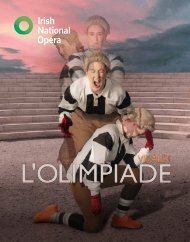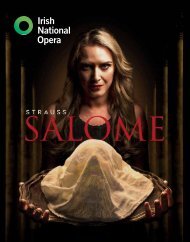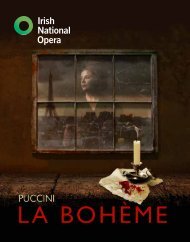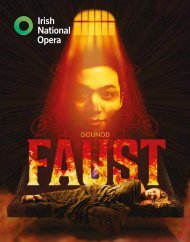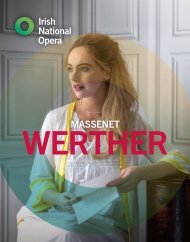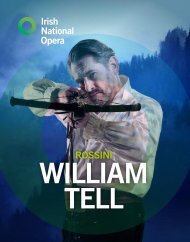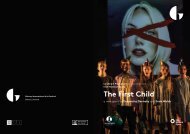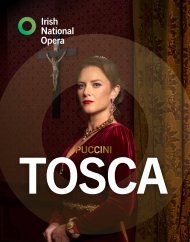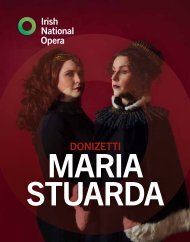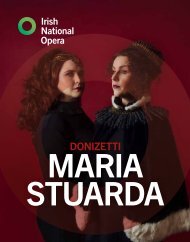Cosí fan tutte programme book 2023
Irish National Opera
Irish National Opera
Create successful ePaper yourself
Turn your PDF publications into a flip-book with our unique Google optimized e-Paper software.
fashionable movie of maybe 30 years ago Diva.<br />
That foreground opera to the kind of audience<br />
that would have been seeing this very trendy,<br />
very slick, very young film. It would have made<br />
quite an impression. And of course there was<br />
‘Nessun dorma’ and the Three Tenors at the<br />
World Cup. The first time I really cottoned<br />
on to Così, I suppose, was when I saw John<br />
Schlesinger’s wonderful film, Sunday, Bloody<br />
Sunday, where ‘Soave sia il vento’ is the theme<br />
tune. It’s about a triangular relationship. This<br />
wonderful trio pulses through the film. It wasn’t<br />
the place one expected to encounter a Mozart<br />
opera. But it brought it to the fore.”<br />
What would be on his dream repertoire list for a<br />
company like INO? “I’d just like them to do my<br />
favourite operas, obviously. I’d like them to do<br />
Don Carlo, and maybe there would be a way of<br />
shaping it to some Irish historic situation. I’d like<br />
them to do some Britten. It would be interesting<br />
to see Britten played in Ireland. Perhaps you<br />
could transpose Peter Grimes to Irish village life<br />
rather than Suffolk village life”. He follows up,<br />
by e-mail, with Janáček’s Káťa Kabanová, which<br />
“would transpose very well to an Irish setting”.<br />
He describes the use of Vivid Faces to inform a<br />
production of Così <strong>fan</strong> <strong>tutte</strong> as “very gratifying.<br />
Polly had read my <strong>book</strong> very closely. She had<br />
picked out in it the things that I was glad to have<br />
concentrated on myself, like the difficulties of<br />
and the rewards of exploring sexual dissidence<br />
against conventional morality as part of the<br />
revolutionary generation’s reactions.<br />
“One thing that I was very struck by when writing<br />
Vivid Faces was the extent to which so many of<br />
the people I was studying were revolting against<br />
their parents as much as against the British<br />
state. The British state stood in for their parents,<br />
and vice versa. I was also very struck by the shift<br />
of attitudes towards conventional morality that<br />
that implied, and the way that people changed<br />
their names. We always think of people who give<br />
themselves names in Irish as just saying that<br />
he or she is a passionate Gaeilgeoir. It’s also a<br />
rejection of the name your parents had given<br />
you. It’s a rejection of the identity your parents<br />
had given you.<br />
“Polly had picked up on those subversive<br />
elements in that generation. I like her idea – I<br />
haven’t seen rehearsals – to project those<br />
subversivenesses or those subversions into her<br />
version of Così, which conveniently is set when<br />
there’s a war for the two lads to go off to. As there<br />
was in the just pre-revolutionary generation.<br />
And with women who, when freed from the<br />
trammels of expectations, end up behaving in an<br />
unconventional and liberated way.<br />
“That’s not the way that Da Ponte or I suspect<br />
Mozart would have seen them behaving. I like<br />
the thought of them not behaving as weak and<br />
corruptible vessels, but as women grabbing their<br />
agency for themselves when they see a bit of<br />
freedom.”<br />
Roy Foster’s Vivid Faces, The Revolutionary<br />
Generation in Ireland, 1890–1923, is published<br />
by Allen Lane.<br />
17




